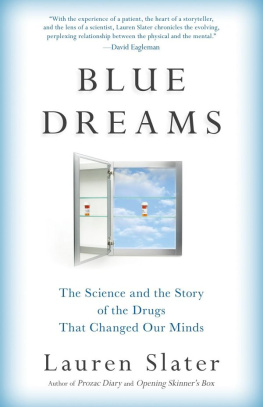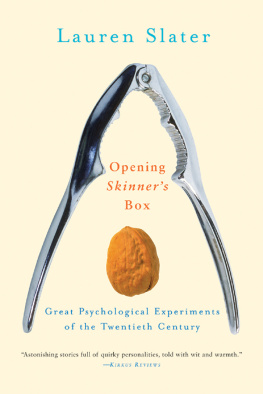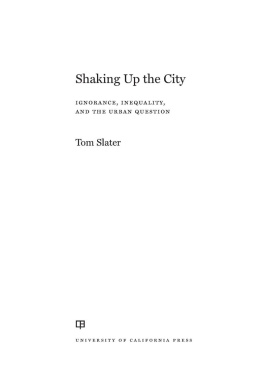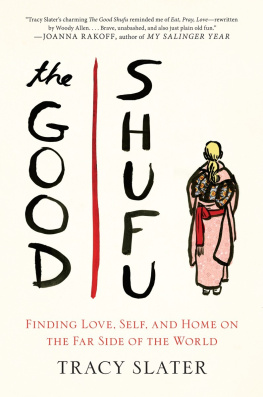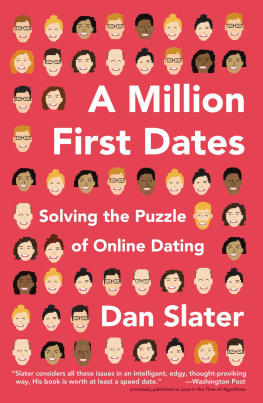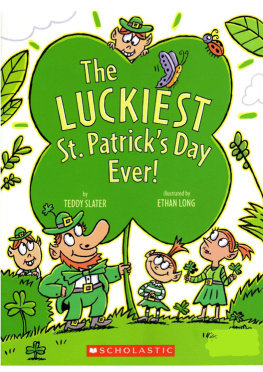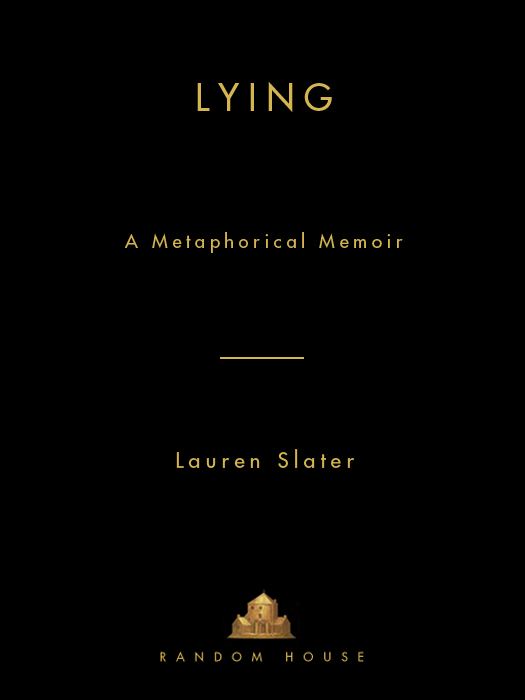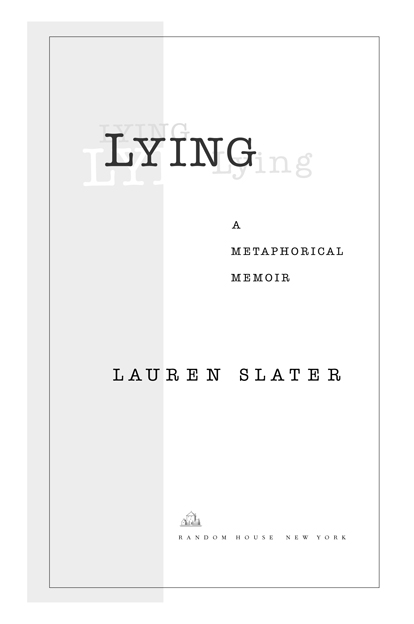Copyright 2000 by Lauren Slater
All rights reserved under International and Pan-American Copyright Conventions. Published in the United States by Random House, Inc., New York, and simultaneously in Canada by Random House of Canada Limited, Toronto.
R ANDOM H OUSE and colophon are registered trademarks of Random House, Inc.
Grateful acknowledgment is made to Alfred A. Knopf, a division of Random House, Inc., for permission to reprint seventeen lines of poetry from The Gold Cell by Sharon Olds. Copyright 1987 by Sharon Olds. Reprinted by permission of Alfred A. Knopf, a division of Random House, Inc.
eISBN: 978-0-307-83016-6
Random House website address: www.atrandom.com
v3.1
Contents
INTRODUCTION
I first encountered Lauren Slater as a writer when I read her account of schizophrenia in her book Welcome to My Country. Since that time I have followed her work, always intrigued by its development. Now, in her third effort, this author brings us a daring meditation on creative nonfiction, a story of epilepsy that is at once entertaining and disturbing. What makes this book disturbing is its incrementally rising refusal to state the facts of the illness about which she writes. By the end of the book, the reader is, indeed, left to wonder whether, or to what degree, Ms. Slater has suffered epilepsy, or if she has used the disease as a meaningful metaphor to convey what are otherwise unutterable experiences in her life.
Using metaphor as a literary technique is not a new concept in fiction; however, using, or suggesting, the use of metaphor as a valid vehicle to convey autobiographical truthsthus her insistence that this book is, indeed, a nonfiction memoiris a new and unsettling idea. Perhaps more unsettling and exciting is the writers insistence on not revealing to us which aspects of her disease are factual, which symbolic, which real, which fantastical, and by doing so asking us to enter with her a new kind of Heideggerian truth, the truth of the liminal, the not-knowing, the truth of confusion, which, if we can only learn to tolerate, yields us greater wisdom in the long run than packaged and parceled facts.
This book requires courage, along with an open and flexible mind. I have been disturbed, widened and exhilarated by my reading of it, as I hope you will be too.
Hayward Krieger
Professor of Philosophy
University of Southern California
The classic grand mal attack, such as this youth suffers, may be divided into four distinct stages. One, the onset. Two, the rigid state. Three, the convulsive stage. Four, the stage of recovery. During stages two and three, the main treatment must be to prevent the convulsion from injuring the patient. There is no fear at this stage of him injuring other people, though the relaxing of the sphincter and the contracture of the abdominal musculature may cause incontinence. A wooden gag should be placed between the teeth before they become clenched, to prevent the patient from either biting himself or those who are assisting him. During stage two, and before stage three has been reached, the clothing should be loosened and the head, the arms, and the legs laid firmly on the ground, with pressure continued for the duration.
F ROM The Text Book of Grand and Petite Mal Seizures in Childhood, 1854
CHAPTER
I exaggerate.
CHAPTER
THREE BLIND MICE
The summer I turned ten I smelled jasmine everywhere I went. At first I thought the smell was part of the normal world, because we were having a hot spell that July, and every night it rained and the flowers were in full bloom. So I didnt pay much attention, except, after a while, I noticed I smelled jasmine in the bath, and my dreams were full of it, and when, one day, I cut my palm on a piece of glass, my blood itself was scented, and I started to feel scared and also good.
That was one world, and I called it the jasmine world. I didnt know, then, that epilepsy often begins with strange smells, some of which are pleasant, some of which are not. I was lucky to have a good smell. Other peoples epilepsy begins with bad smells, such as tuna fish rotting in the sun, dead shark, gin and piss; these are just some of the stories Ive heard.
My world, though, was the jasmine world, and I told no one about it. As the summer went on, the jasmine world grew; other odors entered, sometimes a smell of burning, as though the whole house were coming down.
Which, in a way, it was. There were my mother and my father, both of whom I lovedthat much is truebut my father was too small, my mother too big, and occasionally, when the jasmine came on, I would also feel a lightheadedness that made my mother seem even bigger, my father even smaller, so he was the size of a freckle, she higher than a house, all her hair flying.
My father was a Hebrew School teacher, and once a year he took the bimah on Yom Kippur. My mother was many things, a round-robin tennis player with an excellent serve, a hostess, a housewife, a schemer, an ideologue, she wanted to free the Russian Jews, educate the Falashas, fly on the Concorde, drink at the Ritz. She did drink, but not at the Ritz. She drank in the den or in her bedroom, always with an olive in her glass.
I wanted to make my mother happy, that should come as no surprise. She had desires, for a harp, for seasonal seats at the opera, neither of which my father could afford. She was a woman of grand gestures and high standards and she rarely spoke the truth. She told me she was a Holocaust survivor, a hot-air balloonist, a personal friend of Golda Meir. From my mother I learned that truth is bendable, that what you wish is every bit as real as what you are.
I have epilepsy. Or I feel I have epilepsy. Or I wish I had epilepsy, so I could find a way of explaining the dirty, spastic glittering place I had in my mothers heart. Epilepsy is a fascinating disease because some epileptics are liars, exaggerators, makers of myths and high-flying stories. Doctors dont know why this is, something to do, maybe, with the way a scar on the brain dents memory or mutates reality. My epilepsy started with the smell of jasmine, and that smell moved into my mouth. And when I opened my mouth after that, all my words seemed colored, and I dont know where this is my mother or where this is my illness, or whether, like her, I am just confusing fact with fiction, and there is no epilepsy, just a clenched metaphor, a way of telling you what I have to tell you: my tale.
The summer of the smells was also the summer of new sounds. There were the crickets, which I could hear with astonishing clarity each evening, and the rain on the roof, each drop distinct. There was the piano, which my mother did not tell us about, her secret scheme, delivered one day in ropes and pulleys, its forehead branded Lady Anita.
Return it, my father said.
I cant, she said. Ive had it engraved.
Anita, he said. We were standing in the living room. Anita, theres no room to move with this Steinway in here.
Since when do you move anyway? my mother said. You play pinochle. You pray. You are not a man who requires room.
I never witnessed one of their fights. My father was, by nature, private and shy. My mother, though flamboyant, did not display emotion in public. Whenever a fight came up I was banished to my room. I, however, had long ago discovered that if I put my head in the upstairs bathroom toilet bowl, I could hear everything through the pipes.


